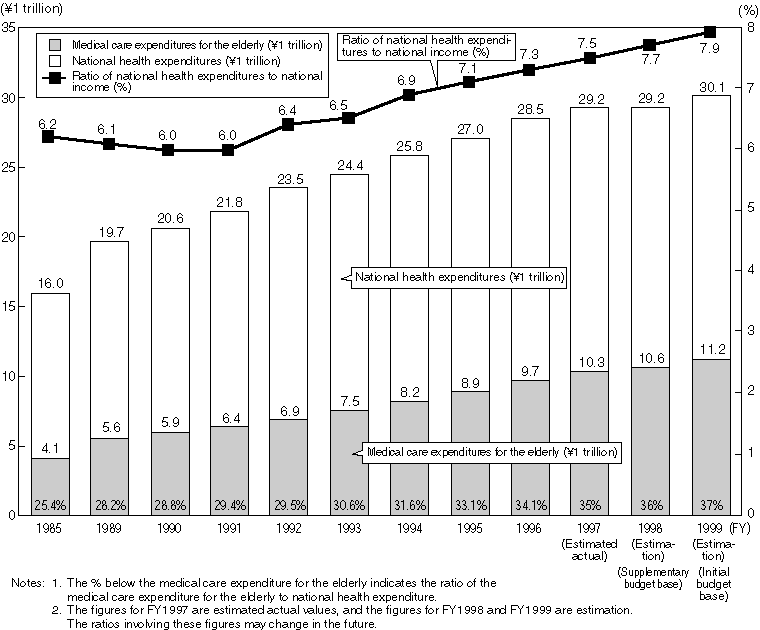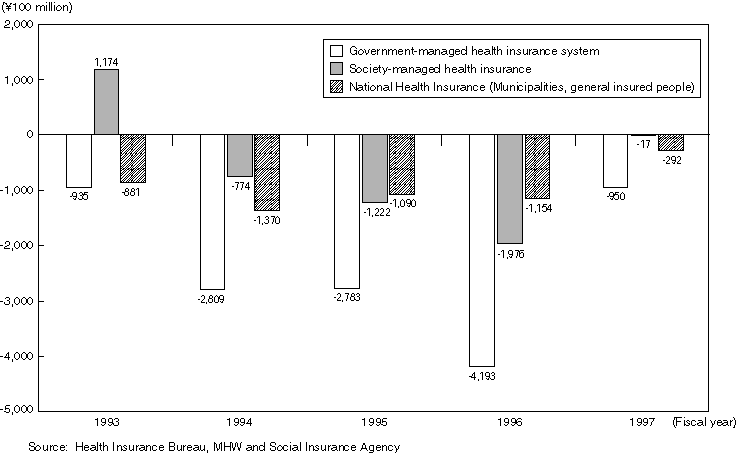
It has been almost 40 years since the establishment of the universal medical care insurance system in 1961. During that time, patients became able to secure the freedom of selecting medical institutions and all citizens were granted to receive high quality medical cares equally through the improvement of the medical insurance system. We must feel proud of these accomplishment.
However, recently the imbalance between increase of medical expenditures and economic growth is expanding because of the increase of medical expenditures along with the rapid increase of aging population and with the advancement of medical technology, and also because of changes in economic trend. While it is difficult to expect high economic growth in the future at the level that we experienced previously, continuing expansion of the imbalance will lead to the rise of national burden of medical expenditures, particularly on younger generations. This may result the universal medical care insurance system itself to lose its credibility.
In addition, with the changes in employment structure and social structure, subscriber configurations of individual medical insurance systems have been changing greatly. While recognizing the difference in subscriber configurations between different systems, we must seriously investigate and decide the way to evenly share the burden of the medical care expenditures for the elderly which will continue to increase with the advancement of aging society and the way to keep the increase rate of medical expenditures mild.
In order to resolve these issues and to ensure the maintenance of reliable and stable medical insurance system in the fully established aged society with fewer children in the 21st Century, we must realize radical reform of the entire system including the medical care delivery system.
(1) Conditions of medical expenditures
According to the recent trend of national health expenditures, actual spending during fiscal 1992 and 1996 is growing on the average of 5% every year, which is about \1.3 trillion, and the national health expenditure in fiscal 1996 was \28.5 trillion. Within this spending, the medical care expenditure for the elderly is growing about 9% every year along with the rapid increase of aging population, and its value in fiscal 1996 was \9.7 trillion, which is about 1/3 of the national health expenditure.
The projected national health expenditure for fiscal 1997 is \29.2 trillion (2.2% of increase from the previous year) and \29.2 trillion for fiscal 1998 (FY1998 supplementary budget base, 0.2% of increase from the previous year). This is a result of the temporary decrease of growth rate due to the revisions made to the Health Insurance Law, etc. in 1997 to increase the co-payment by the insured. However, the projected national health expenditure for fiscal 1999 is \30.1 trillion (FY1999 initial budget base, 3.0% of increase from the previous year), and it is expected to exceed \30 trillion for the first time.
(2) Conditions of medical insurance finance
As explained before, while national health expenditure continues to increase due to the rapid progress of aging, etc., recent economic trend has been sluggish and the growth rate of national income is staying at a low level. Because of this condition, the growth rate of the national health expenditure has been exceeding the growth rate of the national income. Speaking of the current condition in particular, the Health Insurance Organization and the National Health Insurance are contributing to the health service system for the health services for the elderly and supporting the medical care expenditure for the elderly, but with the increase of medical care expenditure for the elderly the ratio of contribution for health services for the elderly in the spending of individual insurers is increasing every year, and it is now reaching about 30% of the medical insurers' expenditure. On the other hand, the revenue from insurance premiums is growing slowly due to the recent severe economic condition. Medical insurance systems are now facing extremely severe financial conditions.
Figure 3-1-1. Changes of National Health Expenditures

Because of these conditions, single year balance of revenue and expenditure in the government-managed health insurance system recorded \95 billion of deficit in fiscal 1997, and its settlement of account has been in the red for five consecutive years since fiscal 1993.
In case of the society-managed health insurance, the estimated settlement of account for fiscal 1997 recorded deficits in 1,001 societies, which is equivalent of 55.2%, and the recurring balance of the entire Health Insurance Society is in the red for \1.7 billion.
For the National Health Insurance, the recurring balance of the single year in fiscal 1997 shows deficits in 1,543 municipalities, which is equivalent of 47.5% of total, and the total balance is also in the red for \29.2 billion.
In general, we escaped from the immediate crisis as a result of the revision made to the Health Insurance Law, etc. in 1997. However, the trend of medical expenditure is moving back to increase mode as observed before the revision, and the difficult conditions are expected to continue into the future.
(3) Conditions of the medical care delivery system
While environment surrounding the medical care system is changing with the rapid progress of aging society and with other causes, various problems have been recognized including the existence of social hospitalization, the average number of hospital days being very long in the international standard, patients' dissatisfactions with long waiting time for outpatients to large hospitals, difference in the availability of medical professionals by region, etc.
Figure 3-1-2. Financial Conditions of Individual Medical Insurance Systems

To maintain the balance between ensured high quality medical care and stable operation of the medical insurance system, it is essential to establish a proper and efficient medical care delivery system to meet the medical demands by clarifying the functional responsibility of individual medical institutions, offering in-hospital medical care to meet the pathology of patients, adjusting the number of physicians, etc.
Also, in order to secure high quality medical care, it is important to improve the quality of medical professionals while respecting patients, to maintain the trustworthy relationship between patients and medical professionals, and to promote the disclosure and offering of medical information.
2. Recent Trend Surrounding the Medical Care System
(1) Details of the discussions on radical reform of the medical care system
In November 1996, the Council on Health Insurance, which is the former function of the Council on the Medical Insurance Welfare, compiled a self-initiated recommendation on radical reform of the medical care system. Responding to the recommendation, a revision was made to the Health Insurance Law, etc. in June 1997 with the assumption that radical reform of the system be implemented. The revision included the increase of co-payment and introduction co-payment for drugs to adjust the use of pharmaceuticals and to stabilize the operation of the medical insurance system for a while.
In December 1996, the three ruling parties formed the Medical Insurance System Reform Council in ruling party and initiated formal discussions on radical reform of the medical care system. In April 1997, the Council formulated the "Basic Policy on Medical System Reform" as it submits the bill of amendment to the Health Insurance Law to the Diet.
In June 1997, the Amendment to the Health Insurance Law was established, but the debates in the Diet pointed out again that the basic guidelines and the detailed plan for radical reform of the medical care system should be presented soon. In response to this comment, the Ministry of Health and Welfare formulated the "Medical Insurance System for the 21st Century" (proposal of MHW) on August 7 of the same year, and with consideration of the comments from the Medical Insurance System Reform Council it compiled the "Medical Care for Citizens in the 21st Century" (proposal of the Medical Insurance System Reform Council) on August 29 of the same year. During this process, it was decided to implement radical reform as much as possible toward year 2000, starting with feasible items.
In the "Law on the Special Measures for the Promotion of Structural Reform" proclaimed in December 1997, it is stated that necessary measures shall be taken in early timing, prior to year 2000, by investigating radical reform of medical insurance system, etc.
(2) Revision of the National health Insurance Law, etc.
During the period prior to the implementation of radical reform of the medical insurance system, the Law of Amendment to the National Health Insurance Law, etc. was established in June 1998 to include the review of the burden on medical care insurers to bear the contribution for the medical care for the elderly and measures for adjusting medical expenditures. According to this law, with the consideration of the increase of retired subscribers and the subscription rate for the elderly for municipal insurers of the National Health Insurance, a half of the contribution for the medical care for the elderly relating to the retired insured people, etc. will be borne by the medical insurance of the insured through the Medical Care Service Program for Retired Employees, and the maximum of the subscription rate for the elderly used for calculating the contribution for the medical care for the elderly is raised from 25% to 30% for the time being, until the implementation of radical reform. Also, in order to secure the credibility of the medical insurance system and to adjust medical expenditures, following conditions are stipulated in the law: 1 extending the time period that the medical insurance does not need to consider the medical care facility and insurance doctor for reassignment after cancellation of their registration of insurance medical care facility or insurance doctor, 2 raising the ratio of additional charge for refund accrued for dishonest billing of medical fees, and 3 when hospitals in a region with excess hospital beds do not follow the advice based on the Medical Service Law, the Governor of the prefecture can exclude a portion of or all beds in such hospitals from insurance medical care facility.